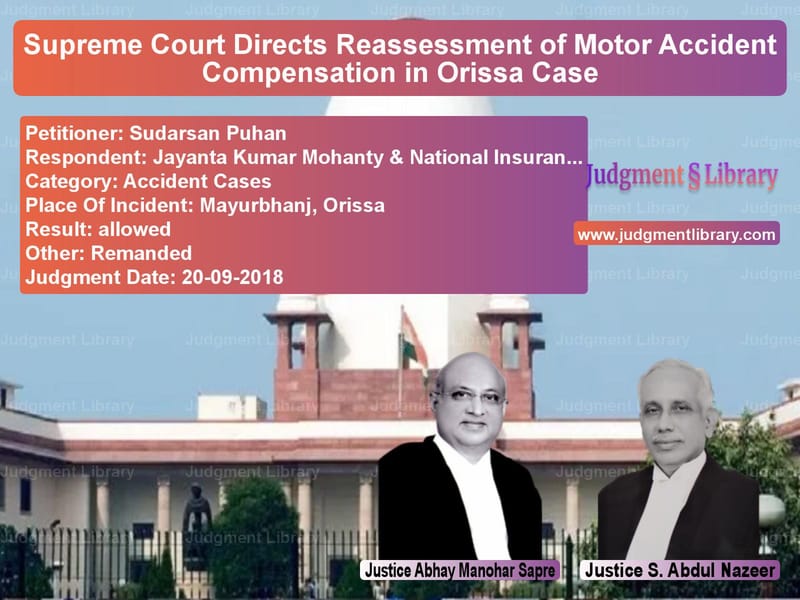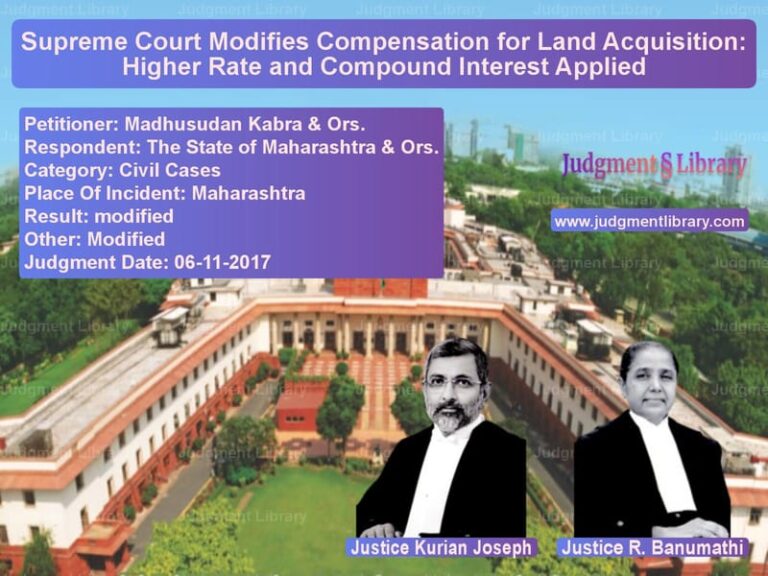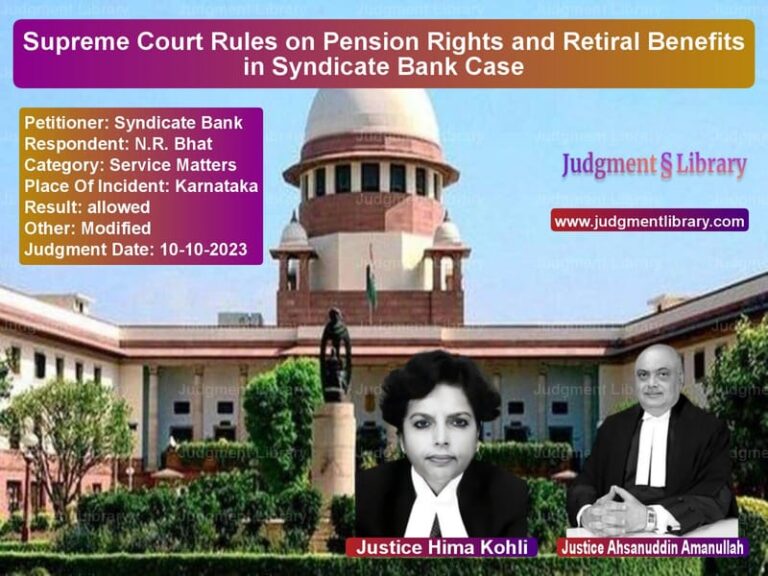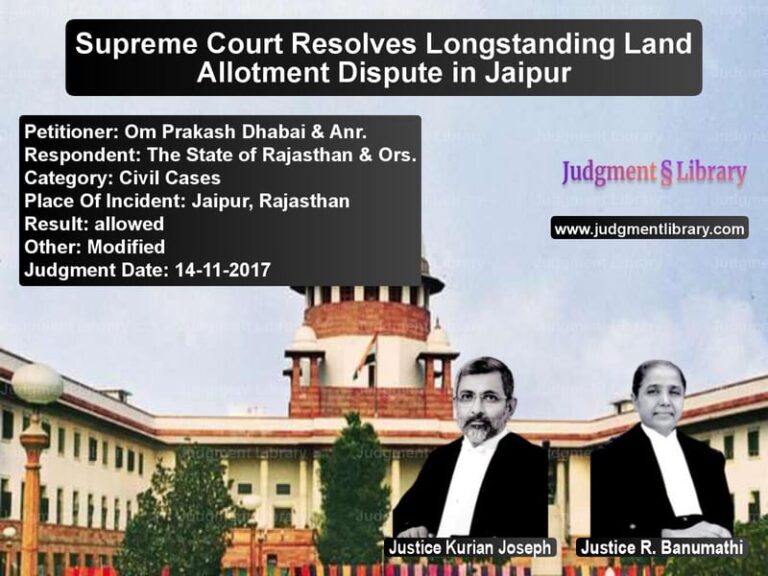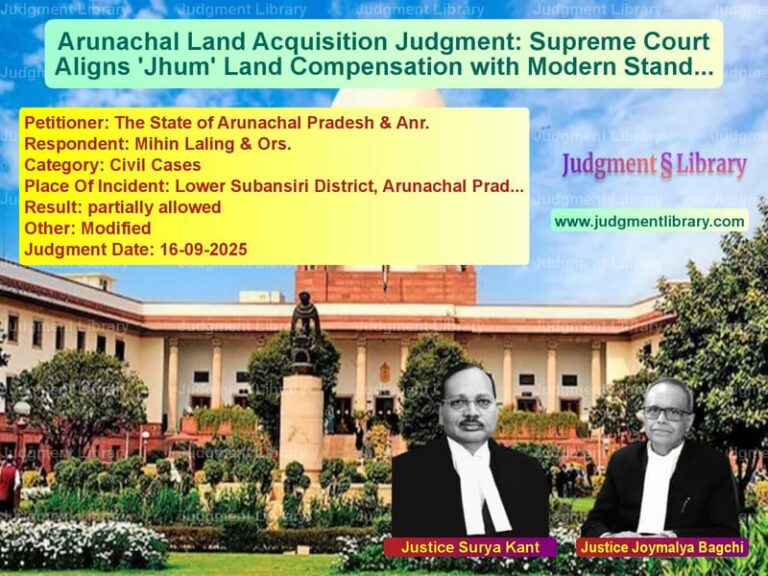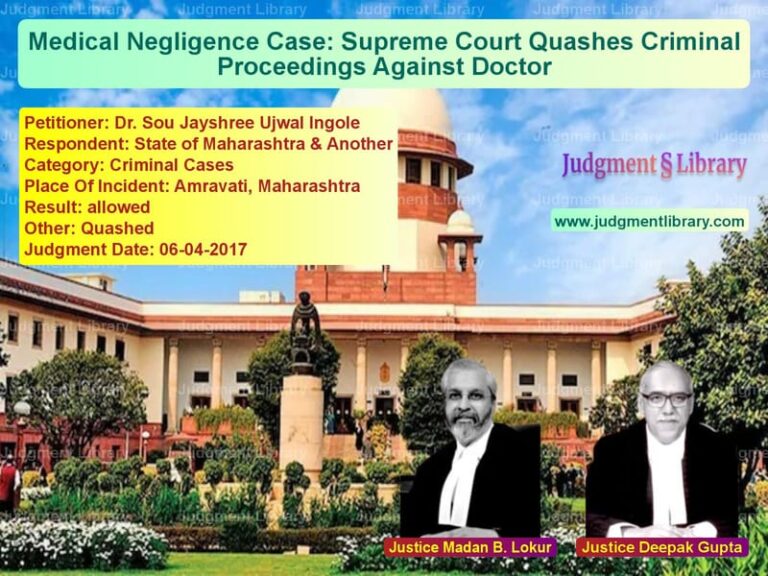Supreme Court Directs Reassessment of Motor Accident Compensation in Orissa Case
The case of Sudarsan Puhan v. Jayanta Kumar Mohanty & National Insurance Company Ltd. revolves around a crucial legal issue related to motor accident claims and the reduction of awarded compensation by the High Court. The Supreme Court had to determine whether the Orissa High Court was justified in lowering the compensation amount granted by the Motor Accident Claims Tribunal (MACT) without providing sufficient reasoning. The Court ultimately remanded the case, emphasizing the duty of appellate courts to evaluate evidence thoroughly before modifying compensation amounts.
Background of the Case
On 31.10.2012, the appellant, Sudarsan Puhan, was involved in a serious road accident while traveling on a motorcycle. The accident occurred on National Highway 18 in Orissa when the motorcycle collided with a mini truck. The appellant suffered life-altering injuries, including paraplegia (a severe spinal cord injury), leading to permanent disability. The motorcycle was owned by the respondent, Jayanta Kumar Mohanty, and insured with the National Insurance Company Ltd.
Following the accident, the appellant filed a claim under Section 166 of the Motor Vehicles Act, 1988, seeking compensation for medical expenses, loss of income, and pain and suffering. The case progressed through multiple stages of litigation, with differing rulings from the Motor Accident Claims Tribunal and the High Court.
Motor Accident Claims Tribunal (MACT) Ruling
The MACT ruled in favor of the appellant and awarded a compensation amount of Rs. 24,62,065/- with an interest rate of 7% per annum. The tribunal held that the respondents (vehicle owner and insurance company) were jointly and severally liable to pay the compensation. The amount covered various heads such as:
- Medical expenses
- Loss of income due to disability
- Pain and suffering
- Future medical care
- Loss of earning capacity
Appeals Before the High Court
Both the appellant and the Insurance Company filed appeals before the Orissa High Court:
- The appellant (claimant) sought an increase in the compensation amount, arguing that his injuries warranted higher compensation.
- The Insurance Company challenged the quantum of compensation, arguing that the awarded amount was excessive.
The High Court ruled in favor of the Insurance Company and reduced the compensation from Rs. 24,62,065/- to Rs. 20,00,000/-. The appellant’s appeal for enhancement was dismissed without detailed reasoning.
Key Legal Issues
The Supreme Court had to consider the following questions:
- Did the High Court provide sufficient justification for reducing the compensation amount?
- Was the claimant’s appeal for enhancement dismissed without proper legal evaluation?
- Should the case be remanded for a fresh hearing?
Arguments by the Appellant
The appellant, Sudarsan Puhan, argued that:
- The High Court arbitrarily reduced the compensation amount without providing any reasoned analysis.
- His injuries were severe and life-altering, and the awarded compensation should have been enhanced, not reduced.
- The High Court failed to conduct a detailed assessment of medical expenses, loss of future earnings, and long-term care costs.
- Legal precedents clearly establish that compensation should be fair and proportionate to the severity of injuries and the impact on the victim’s life.
Arguments by the Respondents
The Insurance Company countered with the following arguments:
- The Tribunal had awarded an excessively high amount, which was not justified by the facts of the case.
- The reduction by the High Court was fair and reasonable given the claimant’s circumstances.
- The awarded amount was sufficient to cover medical and future expenses, and no further enhancement was necessary.
Supreme Court’s Observations
The Supreme Court found that the High Court had erred by reducing the compensation amount without providing detailed reasoning. The Court observed:
“The High Court, while upsetting the judgment of the Tribunal, lost sight of the principles governing compensation awards. It failed to provide any detailed reasoning for its decision, which is a serious flaw.”
The Supreme Court emphasized that appellate courts have a duty to:
- Examine all evidence thoroughly before modifying lower court decisions.
- Provide reasoned justifications for any alterations in compensation amounts.
- Ensure that compensation awards align with established legal principles and factual assessments.
Key Excerpts from the Judgment
The Supreme Court noted:
“Considering the submissions made by the learned counsel for the parties and keeping in view the quantum of compensation amount awarded and the basis on which the same has been arrived at, we feel that the interest of justice would be best served if the awarded compensation is reassessed.”
Furthermore, the Court observed:
“The High Court’s reduction of the compensation was done without proper scrutiny of facts, and it ignored the legal principles applicable to such cases.”
Supreme Court’s Final Verdict
The Supreme Court ruled:
- The High Court’s reduction of compensation from Rs. 24,62,065/- to Rs. 20,00,000/- was unjustified.
- The case should be remanded to the High Court for a fresh consideration of the appellant’s appeal for enhancement.
- The High Court must analyze all aspects of the case, including medical expenses, disability impact, and future income loss.
The Court concluded:
“In view of the foregoing discussion, we remand the appellant’s appeal to the High Court for fresh consideration, uninfluenced by our observations. The High Court is directed to decide the appeal within six months.”
Conclusion
This judgment reinforces the principle that appellate courts must provide well-reasoned justifications when modifying compensation amounts in motor accident claims. The Supreme Court’s intervention ensures that claimants receive fair and adequate compensation based on established legal principles. The decision also underscores the duty of appellate courts to thoroughly examine all evidence before making changes to compensation awards.
Petitioner Name: Sudarsan Puhan.Respondent Name: Jayanta Kumar Mohanty & National Insurance Company Ltd..Judgment By: Justice Abhay Manohar Sapre, Justice S. Abdul Nazeer.Place Of Incident: Mayurbhanj, Orissa.Judgment Date: 20-09-2018.
Don’t miss out on the full details! Download the complete judgment in PDF format below and gain valuable insights instantly!
Download Judgment: Sudarsan Puhan vs Jayanta Kumar Mohant Supreme Court of India Judgment Dated 20-09-2018.pdf
Direct Downlaod Judgment: Direct downlaod this Judgment
See all petitions in Compensation Disputes
See all petitions in Negligence Claims
See all petitions in Motor Vehicle Act
See all petitions in Judgment by Abhay Manohar Sapre
See all petitions in Judgment by S. Abdul Nazeer
See all petitions in allowed
See all petitions in Remanded
See all petitions in supreme court of India judgments September 2018
See all petitions in 2018 judgments
See all posts in Accident Cases Category
See all allowed petitions in Accident Cases Category
See all Dismissed petitions in Accident Cases Category
See all partially allowed petitions in Accident Cases Category

